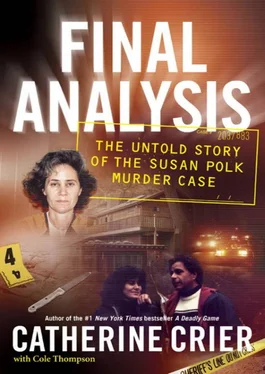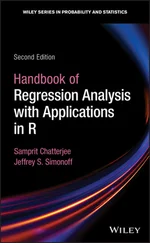“It seems like there’s been a mistake, a miscommunication,” Eli announced after reading the notes from Susan’s former lawyer, Elizabeth Grossman. Eli argued that Grossman was not really working for his mother. He then provided the prosecutor with a rambling explanation that made little sense to those in the courtroom. “It had to do with a conspiracy, a civil conspiracy, as well as the conspiracy to have my mother convicted.”
Sequeira froze in front of the witness box. “Are you telling this jury that Liz Grossman… is part of a large conspiracy to get your mother convicted and to steal from the estate?”
Eli looked directly at Sequeira. “I never said large. It takes two people to conspire.”
“You’re right,” the prosecutor said in a raised voice. “It takes two!” Pacing before the jury, Sequeira directed Eli to identify the members of the alleged conspiracy for the court.
Dumbfounded, Eli looked to his mother, who was at the podium demanding the questioning of her son be halted immediately.
Judge Brady cut Susan off mid-sentence and directed Eli to answer the question.
Repositioning himself in the chair, Eli listed the alleged participants. There was his Uncle John Polk, John’s lawyer, Bud MacKenzie, the Briners, and his dad’s friend, Barry Morris. “They’ve used their connections in this court and others to control things the best that they can.”
“Am I, me, Paul Sequeira, just some guy who works for the D.A.’s office, am I working for this big conspiracy?”
“I have not seen documentation, proof… no one has said anything to lead me to believe that,” Eli said. He also declined to speculate as to whether members of law enforcement were also involved, or that they had “staged” the crime scene, as his mother alleged.
All eyes in the courtroom turned to Susan, who was now chuckling. Addressing the prosecutor, she insisted that she never accused him of being a party to the conspiracy. “But, I’ve had my doubts,” Susan giggled. “You, too, your honor.”
“Ms. Polk, I do not find anything amusing about this,” Judge Brady reprimanded. “And I don’t think the giggling is appropriate. Stop it!”
Friday’s court session adjourned when the prosecutor announced that he had no further questions.
Chapter Twenty-seven
NO MURDER AT ALL
The following Monday, court resumed with Susan’s redirect examination of Eli. She would keep her son on the stand until Thursday afternoon when Judge Brady announced she had heard enough and halted the questioning. During those four days, Susan trotted out numerous e-mails that her sons exchanged after their father’s death and instructed Eli to read them aloud. “I hope you do join the team and then I can see you soon,” Gabe wrote to Eli in January of 2004.
“I’m disappointed in you,” Gabe wrote in another correspondence. “Get your shit together. You’re siding with a person who murdered our dad.”
Gabriel was not the only brother sending e-mails to Eli. In January 2005, Adam sent one saying he would entertain his mother’s request to write a letter to the court, pronouncing, “I don’t believe my mother killed my father in cold blood, but in self-defense.”
In response to questions from Susan, Eli maintained that his elder brother had threatened to disinherit him if he did not join the wrongful death civil suit that Adam and Gabe filed against their mother.
“If I could just apologize for my language beforehand,” Eli asked jurors before reading Gabriel’s final e-mail correspondence aloud. “Eli, if you believe all that shit, you’re a fucking psycho, and I never want to see you again,” Eli read from the page his mother handed him. “I really should start calling you Susan. Grow the fuck up!”
Looking up from the paper, Eli accused Sequeira of “smiling at him.”
The accusation caught the judge off guard. Straightening herself in her chair, Brady glanced at the prosecutor. For the record, she noted that he was sitting at his table, resting his cheek and chin in his hand and gazing away from the witness box.
“I object!” Susan barked. “The district attorney is making faces at my son.”
Brady drew a breath and instructed Susan to move on with her questions.
“Was it like a smiling face?” Susan asked Eli with regard to Sequeira’s supposed grin.
“Mrs. Polk,” the judge interrupted, warning Susan to move on.
“It was like a smirk,” Eli replied.
Brady instructed Eli not to respond after she had ruled.
“I object!” Susan yelled out.
“Is there any way to take this show on the road?” Sequeira interjected, shaking his head in frustration.
“It is a show,” Eli agreed.
Banging her hand on the desk, Brady terminated the proceedings. “All right! We’re done for the day!”
Humorous though it was, the episode reflected Brady’s growing frustration. Whereas once the judge had been willing to tolerate Susan’s behavior, she was becoming much less lenient. Furthermore, Susan continued to bait Sequeira, and her efforts were clearly taking a toll on everyone involved.
On Tuesday, Susan directed her middle son to read letters he had written to her in jail. She was anxious to point out the sections in which Eli referred to his willingness to take the stand and “tell the truth” about Dad, but she didn’t anticipate the unsettling impact that many of the letters would have on the courtroom. As Eli spoke about his mother’s innocence, his voice sounded less and less like a son, and more like a lover. The impact was palpable, as the jurors shifted in their seats.
“I miss you so much it is driving me crazy,” Eli read aloud from one. “You are everything to me…. The truth about Dad needs to come out.”
“P.S. I wake up and see your face,” the note continued. “I love you enough to burn all I am and meet you in the afterlife.”
Susan cried aloud as her son recited the words to jurors. He had already told the court about the framed photo of his mother that he kept in his locker at Byron Boys’ Ranch. He had made the frame in wood shop and hung it in the locker so he could see her face every day.
The testimony that day was disquieting, and Sequeira recognized that Susan may have alienated the jurors with her son’s writings. Once again the prosecutor had uncovered a weak spot to probe, and the following morning he did just that, announcing his intent to introduce short stories that had allegedly been written by Susan about a wife who murders her husband and a mother who has a sexual relationship with her son.
According to Sequeira, he learned of the stories six weeks earlier during a phone call from Susan’s landlord in Montana, former Congressman Chris Harris, who claimed he and his wife came upon the writings while cleaning the cabin. Harris said the writings were tucked under a mattress in the cabin that Susan had rented from him in the fall of 2001, but he was unsure if his wife had kept them. From the handwriting, Harris’s wife had determined that a woman had written the stories.
Susan argued there was no basis to introduce the material into evidence, as the landlord did not even have them in his possession. “There’s speculation that I wrote the dirty story and that I wrote the murder story,” Susan barked. “That’s totally slander. He [Paul Sequeira] should be ashamed of himself! There isn’t anything they wouldn’t say or do to de-fame me!”
Judge Brady postponed a ruling on their admissibility, saying there were “some issues” that needed to be considered.
Angered at the judge’s response, Susan launched into an attack on Sequeira, at one point blurting out, “The man needs a spanking and the judge should give it to him.” Judge Brady did not respond. Instead, she instructed the deputies to return Eli to the courtroom to resume testimony. Eventually she would rule the stories inadmissible.
Читать дальше











